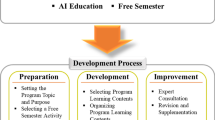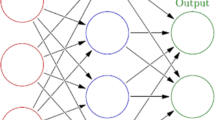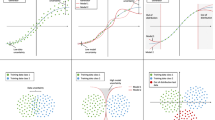Abstract
This paper proposes an Adaptive Fuzzy Neural Agent (AFNA) with a Patch Learning Mechanism and IEEE 1855 Fuzzy Markup Language (FML) for human and machine co-learning. There are three phases of patch learning mechanism embedded in AFNA, including (1) training an initial global model, (2) training a patch model for each identified patch, and (3) updating the global model using the training data that do not fall into any patch. The AFNA can be applied to construct the student and robot co-learning regression model, as well as the regression model for the dataset retrieved from the game of Go. First, students generate human learning data through interactions with handheld devices or robots based on the AFNA in Taiwan and Japan. Then, the AFNA utilizes the student learning data collected in the classroom and the Go game data provided by both Google DeepMind and Facebook AI Research open-source OpenGo to train the Fuzzy Machine-Learning Model. In addition, the trained Fuzzy Machine-Learning Model of AFNA is deployed to the robots to make students and machines co-learn together based on IEEE 1855 FML. The experiments show that the AFNA with Patch Learning Mechanism and Fuzzy Machine-Learning Model can improve the performance of regression model based on the datasets of student learning and Go game. In the future, we hope to apply the AFNA with robots to the other domain areas, embed it with the Artificial Intelligence of Things devices, and introduce it to more teaching fields in various countries.















Similar content being viewed by others
References
Acampora, G., Loia, V.: Fuzzy control interoperability and scalability for adaptive domotic framework. IEEE Trans. Industr. Inf. 1(2), 97–111 (2005)
Acampora, G., Loia, V., Lee, C.S., Wang, M.H.: On the Power of Fuzzy Markup Language. Springer-Verlag, Germany (2013)
IEEE CIS.: 1855–2016-IEEE Standard for Fuzzy Markup Language (2016). https://ieeexplore.ieee.org/document/7479441.
Acampora, G., di Stefano, B., Vitiello, A.: IEEE 1855TM: the first IEEE standard sponsored by IEEE Computational Intelligence Society. IEEE Comput. Intell. Mag. 11(4), 4–7 (2016)
Lee, C.S., Wang, M.H., Tsai, Y.L., Ko, L.W., Tsai, B.Y., Hung, P.H., Lin, L.A., Kubota, N.: Intelligent agent for real-world applications on robotic edutainment and humanized co-learning. J. Ambient. Intell. Humaniz. Comput. 11, 3121–3139 (2019)
Lee, C.S., Wang, M.H., Tsai, Y.L., Chang, W.S., Reformat, M., Acampora, G., Kubota, N.: FML-based reinforcement learning agent with fuzzy ontology for human-robot cooperative edutainment. Int. J. Uncertain. Fuzzin. Knowl.-Based Syst. 28(6), 1023–1060 (2020)
Lee, C.S., Wang, M.H., Yang, S.C., Hung, P.H., Lin, S.W., Shuo, N., Kubota, N., Chou, C.H., Chou, P.C., Kao, C.H.: FML-based dynamic assessment agent for human-machine cooperative system on game of Go. Int. J. Uncertain. Fuzzin. Knowl.-Based Syst. 25(5), 677–705 (2017)
Soto-Hidalgo, J.M., Alonso, J.M., Acampora, G., Alcalá-Fdez, J.: JFML: a java library to design fuzzy logic systems according to the IEEE std 1855–2016. IEEE Access 6, 54952–54964 (2018)
Gámez-Granados, J.C., Rodriguez-Lozano, F.J., Acampora, G., Lee, C.S., Soto-Hidalgo, J.M.: JKinect: a new Java software for designing and assessing gross motor activities in children with autism based on JFML. In: 2020 World Congress on Computational Intelligence (IEEE WCCI 2020), Glasgow, Scotland, UK, Jul. 19–24 (2020)
Lee, C.S., Tsai, Y.L., Wang, M.H., Kuan, W.K., Ciou, Z.H., Kubota, N.: AI-FML agent for robotic game of Go and AIoT real-world co-learning applications. In: 2020 World Congress on Computational Intelligence (IEEE WCCI 2020), Glasgow, Scotland, UK, Jul. 19–24, 2020.
Arrieta, A.B., Diaz-rodrigues, N., Ser, J.D., Bennetot, A., Tabik, S., Barbado, A., Garcia, S., Gil-Lopez, S., Molina, D., Benjamins, R., Chatila, R., Herrera, F.: Explainable artificial intelligence (XAI): concepts, taxonomies, opportunities and challenges toward responsible AI. Inform. Fusion 58, 82–115 (2020)
Adadi, A., Berrada, M.: Peeking inside the black-box: a survey on explainable artificial intelligence (XAI). IEEE Access 6, 52138–52160 (2018)
Hagras, H.: Toward human-understandable, explainable AI. Computer 51(9), 28–36 (2018)
Alonso, J.M., Castiello, C., Magdalena, L., Mencar, C.: Design and validation of an explainable fuzzy beer style classifier. In: Moral, J.M.A., Castiello, C., Magdalena, L., Mencar, C. (eds.) Explainable Fuzzy Systems: Paving the Way from Interpretable Fuzzy Systems to Explainable AI Systems Studies in Computational Intelligence, vol. 970, pp. 169–217. Springer, Cham (2021)
Alonso, J.M.: Teaching explainable artificial intelligence to high school students. Int. J. Comput. Intell. Syst. 13(1), 974–987 (2020)
Jang, J.S.R.: ANFIS: adaptive-network-based fuzzy inference system. IEEE Trans. Syst. Man Cybern. 23(3), 665–685 (1993)
El-Hasnony, I.M., Barakat, S.I., Mostafa, R.R.: Optimized ANFIS model using hybrid metaheuristic algorithms for Parkinson’s disease prediction in IoT environment. IEEE Access 8, 119252–119270 (2020)
Khan, M.A., Algarni, F.: A healthcare monitoring system for the diagnosis of heart disease in the IoMT cloud environment using MSSO-ANFIS. IEEE Access 8, 122259–122269 (2020)
Ai-Hmouz, A., Shen, J., Ai-Hmouz, R., Yan, J.: Modeling and simulation of an adaptive neuro-fuzzy inference system (ANFIS) for mobile learning. IEEE Trans. Learn. Technol. 5(3), 226–237 (2012)
Wu, D., Mendel, J.M.: Patch learning. IEEE Trans. Fuzzy Syst. 28(9), 1996–2008 (2020)
Zakeri, A., Saberi, M., Hussain, O.K., Chang, E.: Addressing missing data and data competitiveness issues: transforming tacit knowledge into explicit form by fuzzy inference learning system. Int. J. Fuzzy Syst. 20, 1224–1239 (2018)
van Zoelen, E.M., van den Bosch, K., Neerincx, M.: Becoming team members: identifying interaction patterns of mutual adaptation for human-robot co-learning. Front. Robot. AI 8, 692811 (2021)
McMahan, B., Ramage, D.: Federated learning: collaborative machine learning without centralized training data. (2017). https://ai.googleblog.com/2017/04/federated-learning-collaborative.html.
Yang, Q., Liu, Y., Chen, T., Tong, Y.: Federated machine learning: concept and applications. ACM Trans. Intell. Syst. Technol. 10(2), 1–19 (2019)
Hwang, K.S., Lin, J.L., Shi, H., Chen, Y.Y.: Policy learning with human reinforcement. Int. J. Fuzzy Syst. 18, 618–629 (2016)
Lee, C.S., Wang, M.H., Ciou, Z.H., Chang, R.P., Tsai, C.H., Chen, S.C., Huang, T.X., Sato-Shimokawara, E., Yamaguchi, T.: Robotic assistant agent for student and machine co-learning on AI-FML practice with AIoT application. In: 2021 IEEE International Conference on Fuzzy Systems (FUZZ-IEEE 2021), Luxembourg, Luxembourg, Jul. 11–14 (2021)
Lee, C.S., Kubota, N., Yamaguchi, T.: AI-FML Human and Machine Co-Learning. Acmebooks Publishing Co., Ltd, Taiwan (2020). (in Chinese)
Embretson, S.E., Steven, P.R.: Item Response Theory. Psychology Press, New York (2013)
Lee, C.S., Wang, M.H., Wang, C.S., Teytaud, O., Liu, J.L., Lin, S.W., Hung, P.H.: PSO-based fuzzy markup language for student learning performance evaluation and educational application. IEEE Trans. Fuzzy Syst. 26(5), 2618–2633 (2018)
Silver, D., Huang, A., Maddison, C.J., Guez, A., Sifre, L., van den Driessche, G., Schrittwieser, J., Antonoglou, I., Panneershelvam, V., Lanctot, M., Dieleman, S., Grewe, D., Nham, J., Kalchbrenner, N., Sutskever, I., Lillicrap, T., Leach, M., Kavukcuoglu, K., Graepel, T., Hassabis, D.: Mastering the game of Go with deep neural networks and tree search. Nature 529, 484–489 (2016)
DeepMind, AlphaGo Master series: 60 online games, Jan. (2020). https://deepmind.com/alphago-master-series.
Tian, Y., Zhu, Y.: Better computer Go player with neural network and long-term prediction. In: 5th International Conference on Learning Representations (ICLR 2017), Toulon, France, Apr. 24–26 (2017).
Tian, Y., Ma, J., Gong, Q., Sengupta, S., Chen, Z., Pinkerton, J., Zitnick, C.L.: ELF Open Go: an analysis and open reimplementation of AlphaZero. In: Proceedings of the 26th International Conference on Machine Learning Research (PMLR 2019), Vancouver, Canada, Dec. 8–14, vol. 97, pp. 6244–6253 (2019)
Silver, D., Schrittwieser, J., Simonyan, K., Antonoglou, I., Huang, A., Guez, A., Hubert, T., Baker, L., Lai, M., Bolton, A., Chen, Y., Lillicrap, T., Fan, H., Sifre, L., van den Driessche, G., Graepel, T., Hassabis, D.: Mastering the game of Go without human knowledge. Nature 550, 354–359 (2017)
Lee, C.S., Tsai, Y.L., Wang, M.H., Kubota, N.: AI-FML agent with patch learning mechanism for robotic game of Go application. In: 2020 IEEE International Conference on Systems, Man, and Cybernetics (IEEE SMC 2020), Toronto, Canada, Oct. 11–14, (2020)
Acknowledgements
The authors would like to thank the financial support sponsored by the Ministry of Science and Technology (MOST) of Taiwan under the grant MOST 109-2622-E-024-001-CC1 and MOST 108-2218-E-024-001. The authors would like to thank the staff of the KWS Center and OASE Lab. of NUTN as well as the involved faculty and students of Gueinan elementary school and Rende elementary school in Taiwan. Finally, the authors would like to thank Rinpin Chang for editing the videos adopted in this paper.
Author information
Authors and Affiliations
Corresponding author
Rights and permissions
About this article
Cite this article
Lee, CS., Tsai, YL., Wang, MH. et al. Adaptive Fuzzy Neural Agent for Human and Machine Co-learning. Int. J. Fuzzy Syst. 24, 778–798 (2022). https://doi.org/10.1007/s40815-021-01188-6
Received:
Revised:
Accepted:
Published:
Issue Date:
DOI: https://doi.org/10.1007/s40815-021-01188-6




